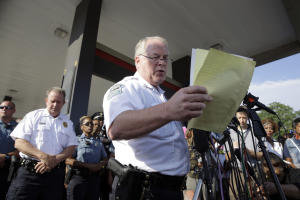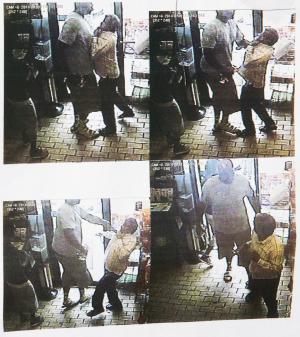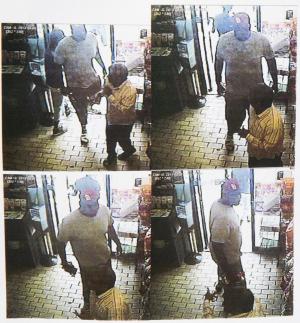Ferguson Police Chief Thomas
Jackson released several police reports and documents during a news
conference where he also identified the officer involved as Darren
Wilson, who has been on administrative leave since he shot 18-year-old
Michael Brown on Aug. 9. VIDEO
Brown
and his friend, Dorian Johnson, were suspected of taking the cigars
from a convenience store in Ferguson that morning, according to police
reports. Jackson said Wilson went to the area after a 911 call reporting
a "strong-arm" robbery just before noon. He said a dispatcher gave a
description of the suspect, and that Wilson encountered Brown a few
minutes before another officer arrived.
Jackson
said Wilson is a six-year veteran of the police department, but he
refused to release any other details about the officer.
The
family's attorney, Benjamin Crump, accused police of trying to draw
attention away from Brown's death. He said Brown's parents were
"incensed" by what he calls "the old game of smoke and mirrors."
"It's bad enough they assassinated him, and now they're trying to assassinate his character," Crump said.Johnson acknowledged to the FBI and other investigators that he and Brown went to the store and "that he did take cigarillos," his attorney, Freeman Bosley, told MSNBC.
Bosley said he was aware of security video from the store but had not seen it.
Police
released security video, dated Aug. 9, that appears to show a man
wearing a ball cap, shorts and white T-shirt grabbing a much shorter man
by his shirt near the store's door. A police report alleges that Brown
grabbed a man who had come from behind the store counter by his shirt
and "forcefully pushed him back" into a display rack.
Brown's
uncle, Bernard Ewing, questioned whether Wilson really believed Brown
was a suspect. He noted Johnson's account that the officer told the two
young men to get out of the street and onto the sidewalk, and that Brown
had his hands up when he was shot.
"If
he's a robbery suspect, they would have had the lights on," Ewing said.
"If you rob somebody, you would tell them, 'Get on the ground' or
something, not, 'Get off the sidewalk.'"
"It still doesn't justify shooting him when he puts his hands up," he added. "You still don't shoot him in the face."
Brown's
death has sparked several days of clashes with furious protesters in
the city. The mood was quelled on Thursday after the governor turned
oversight of the protests over to the state Highway Patrol. State
troopers walking side-by-side with thousands of peaceful protesters
replaced the image of previous nights: police in riot gear and armored
tanks.
But the police chief's
announcement Friday was met with immediate disbelief and anger by
several dozen community members who also attended the news conference,
which was hastily held at a gas station burned during a night of looting
earlier in the week in Ferguson, a town of 21,000 that is nearly 70
percent black and patrolled by a nearly all-white police force.
"He stopped the wrong one, bottom line," yelled Tatinisha Wheeler, a nurse's aide who was at the news conference.
A
couple dozen protesters began marching, chanting "Hands up, don't
shoot" and "What do we want? Justice! When do we want it? Now!"
Police have said Brown was
shot after an officer encountered him and another man on the street
during a routine patrol. They say one of the men pushed the officer into
his squad car, then physically assaulted him in the vehicle and
struggled with the officer over the officer's weapon. At least one shot
was fired inside the car before the struggle spilled onto the street,
where Brown was shot multiple times, according to police.
Dorian
Johnson has told media a different story. He said an officer ordered
him and Brown onto the sidewalk, then grabbed his friend's neck and
tried to pull him into the car before brandishing his weapon and firing.
He said Brown started to run and the officer pursued him, firing
multiple times.
Tensions in
Ferguson boiled over after a candlelight vigil Sunday night, as looters
smashed and burned businesses in the neighborhood, where police have
repeatedly fired tear gas and smoke bombs.
By Thursday, there was a
dramatic shift in the atmosphere after Gov. Jay Nixon assigned protest
oversight to Highway Patrol Capt. Ron Johnson, who is black and grew up
near Ferguson. He marched alongside protesters."We're here to serve and protect," Johnson said. "We're not here to instill fear."
The streets were filled
with music, free food and even laughter. When darkness fell — the point
at which previous protests have grown tense — no uniformed officers were
in sight outside the burned-out QuikTrip convenience store, which had
become a flashpoint for standoffs between police and protesters.
"All
they did was look at us and shoot tear gas," Pedro Smith, who has
participated in the nightly protests, said Thursday. "This is totally
different. Now we're being treated with respect."
The
more tolerant response came as President Barack Obama spoke publicly
for the first time about the shooting — and the subsequent violence.
Obama said there was "no excuse" for violence either against the police
or by officers against peaceful protesters.
Attorney General Eric Holder has said federal investigators have interviewed witnesses to the shooting.






